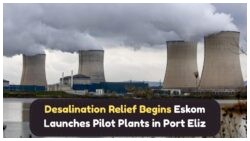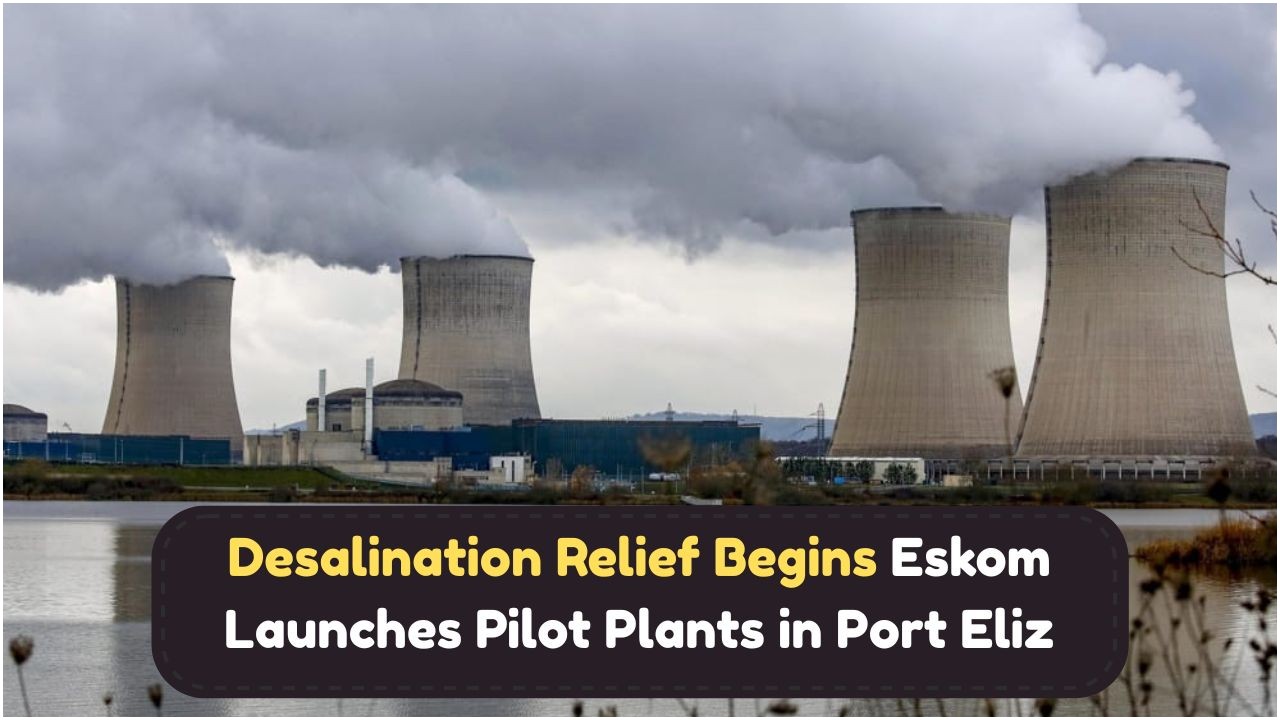Cape Town’s Water Security Boost: On 5 September, Cape Town marks a milestone in its journey toward enhanced water security with the unveiling of a state-of-the-art R1.5 billion reservoir. This significant infrastructure project is poised to transform the water supply landscape in the region, promising to safeguard the city against future droughts and water shortages. As Cape Town continues to grow and urbanize, the demand for a reliable water supply becomes increasingly paramount. The new reservoir, therefore, represents not just a solution to immediate challenges, but also a crucial component of the city’s long-term sustainability strategy. Local officials emphasize the project’s role in ensuring that residents and businesses alike have consistent access to this precious resource, a vital step in supporting Cape Town’s economic and social development.
Unveiling of Cape Town’s R1.5 Billion Reservoir
The unveiling of this cutting-edge reservoir marks a pivotal moment for Cape Town. Located strategically to maximize efficiency and distribution, the facility is designed to hold a substantial volume of water, addressing both current needs and future demands. The reservoir’s construction was driven by innovative engineering techniques, ensuring it meets the highest standards of sustainability and resilience. Local leaders and environmental experts have lauded the initiative, highlighting its potential to significantly bolster Cape Town’s water security. This development is not just a leap in infrastructure but also a testament to the city’s commitment to proactive resource management, a necessity given the looming threats of climate change and urban expansion. As the city prepares to unveil this vital project, it underscores the importance of continued investment in infrastructure to support a thriving urban environment.
 Eskom Achieves October Energy Milestone: Kusile Unit 6 Launch Adds 800 MW, Easing Load Shedding!
Eskom Achieves October Energy Milestone: Kusile Unit 6 Launch Adds 800 MW, Easing Load Shedding!
- Strategic location for optimal water distribution.
- Innovative engineering and sustainability practices.
- Addresses both current and future water demands.
- Significant boost to water security in the region.
- Part of Cape Town’s long-term sustainability strategy.
- Project supported by local leaders and environmental experts.
- Response to climate change and urban growth challenges.
Impact on Cape Town’s Water Supply
The impact of the R1.5 billion reservoir on Cape Town’s water supply cannot be overstated. With its vast capacity, this infrastructure is set to enhance the reliability and efficiency of water distribution across the city. Residents can look forward to a more consistent water supply, reducing the risks associated with droughts and shortages that have plagued the region in the past. Furthermore, the reservoir is expected to play a crucial role in maintaining water quality, as it incorporates advanced filtration and purification technologies. This ensures that Cape Town’s water supply remains not only abundant but also safe for consumption. The reservoir is also part of a broader initiative to improve the city’s infrastructure resilience, supporting Cape Town’s goal of becoming a water-smart city.
| Feature | Description | Benefit |
|---|---|---|
| Capacity | Large-volume storage | Ensures consistent supply |
| Location | Strategically positioned | Optimal distribution |
| Technology | Advanced purification | Improved water quality |
| Sustainability | Eco-friendly design | Long-term viability |
| Impact | City-wide service | Enhanced resilience |
Driving Sustainability in Cape Town
As Cape Town continues to grow, driving sustainability becomes a key focus for municipal planners. The new reservoir is a cornerstone of this effort, showcasing how infrastructure can be designed to support environmental goals. The project employs eco-friendly construction practices, minimizing its carbon footprint while maximizing efficiency. By investing in sustainable infrastructure, Cape Town demonstrates a commitment to reducing its environmental impact, aligning with global best practices in urban management. This approach not only addresses immediate needs but also sets the stage for future advancements in the city’s quest for sustainability. The reservoir is a testament to the city’s proactive stance in addressing the challenges posed by climate change and population growth.
 SASSA's R370 Christmas Grant: Early Payment Alert for December 23rd - Check Your Bank Notifications!
SASSA's R370 Christmas Grant: Early Payment Alert for December 23rd - Check Your Bank Notifications!
- Eco-friendly construction practices.
- Minimized carbon footprint.
- Alignment with global sustainability standards.
- Proactive approach to climate change.
- Support for continued urban growth.
Community and Economic Benefits
The community and economic benefits of the reservoir are manifold. For local residents, the increased water security translates to a better quality of life, with fewer disruptions and a more reliable supply. For businesses, the assurance of a stable water supply is vital for operations, particularly in industries that are heavily dependent on water. Moreover, the construction and ongoing management of the reservoir have created numerous job opportunities, boosting the local economy. This project underscores the interconnection between infrastructure development and economic growth, as stable resources attract investment and support business continuity. The reservoir is not just a water facility; it’s a catalyst for economic resilience and community well-being.
 Eskom Launches Desalination Pilot Plants in PE This September to Tackle SA's Water Crisis!
Eskom Launches Desalination Pilot Plants in PE This September to Tackle SA's Water Crisis!
| Aspect | Community Impact | Economic Impact |
|---|---|---|
| Water Security | Enhanced quality of life | Improved business operations |
| Job Creation | Local employment opportunities | Boost to local economy |
| Infrastructure | Reliable supply for daily needs | Attraction for investment |
Looking Ahead: Cape Town’s Water Future
As Cape Town looks to the future, the reservoir signifies a strategic approach to water management. It serves as a model for future projects, demonstrating the importance of integrating sustainability and innovation into infrastructure planning. The city’s focus on long-term solutions ensures that it remains resilient in the face of environmental challenges. As global climate patterns shift, Cape Town’s proactive measures in water security will help safeguard its residents and economy. With continued investment and innovation, the city is poised to lead in sustainable urban water management.
- Integration of sustainability in planning.
- Model for future infrastructure projects.
- Resilience against environmental challenges.
- Proactive water security measures.
- Leadership in urban water management.
Challenges and Lessons Learned
While the reservoir project is a success, it also highlights challenges and lessons learned. The complexity of such large-scale infrastructure requires meticulous planning and coordination across multiple sectors. The city faced challenges in aligning environmental sustainability with economic feasibility, ensuring that the project remained within budget while achieving its goals. Lessons learned from this project include the importance of stakeholder engagement and transparent communication throughout the process. These insights are invaluable for future initiatives, ensuring that Cape Town continues to evolve as a leader in sustainable infrastructure development.
| Challenge | Solution | Lesson Learned |
|---|---|---|
| Scale Complexity | Detailed planning | Importance of coordination |
| Budget Constraints | Efficient resource allocation | Balancing cost and quality |
| Stakeholder Engagement | Transparent communication | Value of collaboration |
FAQs on Cape Town’s Water Security Project
Here are some frequently asked questions about Cape Town’s water security project and its implications.
- What is the main purpose of the new reservoir? The reservoir aims to enhance water security by providing a reliable and sustainable water supply for Cape Town.
- When was the reservoir unveiled? The reservoir was officially unveiled on 5 September.
- How does the reservoir contribute to sustainability? It employs eco-friendly practices and technologies to minimize environmental impact while ensuring efficient water management.
- What are the economic benefits of the reservoir? The project has created jobs, stimulated local economic growth, and ensured stable water supply for businesses.
- How does the reservoir improve water quality? Advanced filtration and purification systems ensure that the water is safe and clean for consumption.







